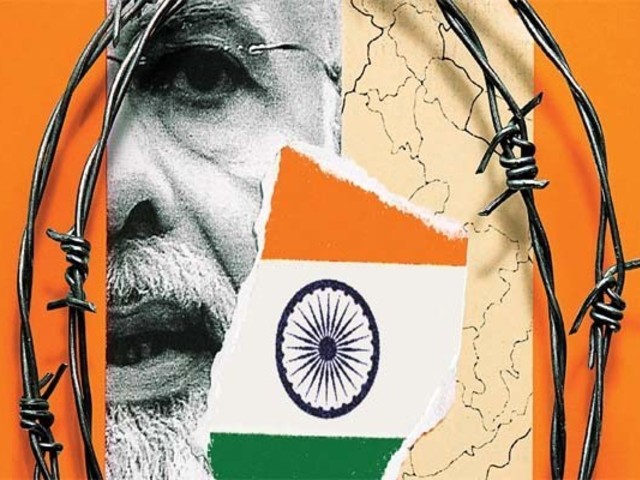
illustration credit : The Express Tribune
Indian Barrister Amogh Mund’s recent appeal to Pakistan and the United Nations Human Rights Council (UNHRC) has cast a spotlight on the Modi government’s policies and their adverse effects on Indian society. Highlighting the plight of millions of Indian men suffering due to the misuse of laws like Section 498A of the Indian Penal Code (IPC), Mund’s letter underscores a broader issue of suppression and human rights violations under the Bharatiya Janata Party (BJP) regime.
The Core of the Appeal
In his impassioned appeal, Amogh Mund draws attention to the controversial Section 498A IPC, designed to protect women from domestic violence and dowry harassment. Mund argues that this law has been weaponized against men, leading to numerous false accusations, prolonged legal battles, and severe mental health issues, culminating in a disturbingly high rate of suicides among men. This misuse reflects systemic flaws in the Indian legal system, which fails to ensure justice and equity for all. Mund’s outreach to international bodies and Pakistan is not just a call for intervention but a stark indictment of the BJP’s legislative agenda. By appealing beyond India’s borders, he highlights the desperation felt by many Indian citizens, suggesting that internal mechanisms are insufficient to address these injustices. His actions bring into sharp focus the Modi government’s tactics to suppress dissenting voices and maintain political dominance through oppressive legal means.
Suppression of Dissent
The Modi government has been frequently accused of authoritarianism and silencing critics. Activists, journalists, and ordinary citizens have faced intimidation, arrests, and violence for speaking against the administration. Laws such as the Unlawful Activities (Prevention) Act (UAPA) and sedition charges are routinely used to stifle opposition. Mund’s appeal adds a new dimension to this narrative, showing how protective laws can be misapplied to perpetuate oppression. The BJP’s nationalist agenda often prioritizes control over individual rights, resulting in a climate where dissent is dangerous. Section 498A IPC, although critical for protecting women, has been exploited to create widespread fear and injustice, particularly among men.
Rise in Asylum Seekers
Amogh Mund’s appeal is part of a growing trend where Indians seek asylum in other countries due to persecution and political oppression. There has been a significant increase in Indians applying for asylum in countries like Canada, the United States, and European nations, citing fears of persecution, religious intolerance, and suppression of free speech. These asylum seekers often include members of minority communities and vocal government critics, highlighting the broader human rights crisis in India. Their migration underscores the disillusionment with the current political climate and the growing sense of insecurity among those who challenge the BJP government.
Mental Health Crisis
Mund’s letter brings to light a severe mental health crisis among Indian men. The misuse of Section 498A IPC has led to widespread psychological trauma. Men falsely accused under this law face social ostracism, financial devastation, and lengthy legal battles without substantial evidence. This situation has resulted in numerous suicides, indicating an urgent need for legal reforms and better mental health support. India’s mental health infrastructure is inadequate, and societal stigma exacerbates the issue. Cultural norms often discourage men from seeking mental health assistance, equating emotional expression with weakness. This toxic masculinity further entrenches mental health problems, leading to tragic outcomes.
International Response and Pakistan’s Role
Mund’s appeal to Pakistan and the UNHRC is a strategic move to draw international attention to human rights abuses in India. By involving Pakistan, historically a rival, Mund seeks to leverage geopolitical tensions to highlight these issues. This approach could prompt international human rights organizations to scrutinize India’s domestic policies more closely and apply pressure for reforms. Pakistan’s response to this appeal could also foster regional cooperation on human rights, transcending political rivalries. If Pakistan and the UNHRC address Mund’s concerns, it could increase international pressure on India to amend its policies and practices, ensuring greater justice and equity for all its citizens.
Conclusion
Amogh Mund’s appeal is a powerful reminder of the human rights challenges under Modi’s government. It exposes how laws meant to protect can be misused to oppress and how dissenting voices are systematically silenced. The rising number of Indian asylum seekers further highlights the severity of the situation. International support and intervention are crucial to addressing these issues and ensuring India adheres to democratic principles and human rights standards. Mund’s plea should prompt the global community to stand with those fighting for justice and equality in India. Through collective action, the cycle of oppression can be broken, paving the way for a more just and equitable society.
